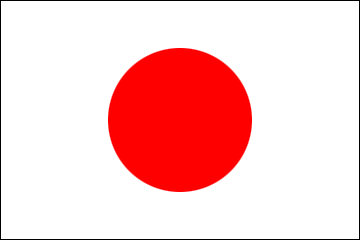TICAD Follow-up Public Lecture on Health
2017/3/24
The G7 Ise-Shima Summit Meeting in Japan and the 6th Tokyo International Conference on African Development (TICAD VI) saw Japan lead the discussion on global health. During these two Summit Meetings, and particularly during TICAD, “Promoting Resilient Health Systems for Quality of Life” was identified as a priority area of focus. Japan thus committed itself to strengthening medical services in Africa with a view to attaining Universal Health Coverage (UHC).
The Embassy of Japan held a TICAD Follow-up Public Lecture on Health as a follow-up to the discussions during TICAD VI. The theme of the Public Lecture was how Japan’s robust health care system developed in the 70 years since World War II and how Kenya can borrow from Japan’s experience.
The Public Lecture was held at the Embassy of Japan on Friday, March 24, 2017. The public lecture consisted of a presentation (Global Health Landscape and Japan’s commitment in the era of SDGs) delivered by Professor Tomohiko Sugishita, International Affairs and Tropical Medicine, Tokyo Women’s University, Japan and a panel discussion. The panelists for this discussion were Dr. Stephen Kaboro, Economist, Ministry of Health; Dr. Peter Kamunyo, Director, Kenya Healthcare Federation and Mr. Wycliffe Muga, Newspaper columnist and MIT Fellow of the Knight Science Journalism Fellowship. As a moderator, Dr. Willis Akhwale, Country Director, I-Tech Kenya, participated in the discussion.
The Public Lecture was officially opened by Mr. Yoshihiro Katayama, Minister Counsellor at the Embassy of Japan. In his opening remarks, Mr. Katayama stated that the Public Lecture was particularly timely given the attention accorded in recent days to the state of health services here in Kenya. He further stated that he hoped that the discussion would examine the real and very critical challenges facing healthcare provision in Africa, and also offer some ideas towards the future.
Following Mr. Katayama’s opening remarks, Prof. Sugishita, who has been engaged with the health sector in Africa for more than 20 years, delivered his presentation.
Giving the example of Japan’s experience in developing a robust healthcare system, Prof. Sugishita stated that after the devastation of World War 2, those left behind after the war especially women and children had to find a way of moving forward in light of their new reality. The people therefore learnt to rely on the community as opposed to being individualistic. This changed the people’s mindset where Primary Health Care and health promoting activities were more emphasised. For example, exercise became part and parcel of Japanese people’s lifestyle.
There was also an incremental development in health sector financing. Japan’s insurance system was greatly promoted as a result of the political will towards “investment for health”. The government came up with ways of letting the general population come to understand that health was costly and it was therefore important to invest in insurance.
There was also the introduction of fee regulation and control. This meant that irrespective of where a person received medical services or the qualifications of the health personnel, the fees paid was standardized.
In addition to strengthening its own health systems, Japan has also sought to promote health diplomacy. Japan has severally led the discussion on global health, most recently, the G7 Ise-Shima Summit Meeting in Japan and the 6th Tokyo International Conference on African Development (TICAD VI) in Kenya.
Prof. Sugishita concluded his lecture by giving the illustration of drifting babies. If hundreds of babies were drifting downstream, it would be impossible for one person to save all the babies without the risk of being drowned too. To solve this problem, a person would have to investigate system in which babies drifted and then deal with that issue.
Mr. Muga was the first of the panelists to comment on the discussion. He stated that considering our unique challenges, the solution is not to learn from developed countries but to come up with our own systems which reflect our reality.
Dr. Kamunyu stated that it is important for the Kenyan government to commit to funding healthcare and rope in the private sector. He also mentioned that it was important to efficiently use healthcare by reducing waste in cost and ploughing back the profits so as to further improve healthcare.
Echoing Prof. Sugishita, Dr. Kaboro reiterated that it is necessary for Kenya to develop its own healthcare policies and strategies which will move it to self-reliance. He also noted that Kenya cannot just depend on public healthcare; a public-private partnership is the only way that Kenya can truly move towards UHC.
Dr. Akhwale remarked that in Kenya, quality healthcare often corresponds to high cost. He stated that it was important to come up with a way of minimising cost and maintaining quality.
Prof. Miriam Were, the Chancellor of Moi University wrapped up the session. In her closing remarks, she noted that in promoting health, mindset determines action. The action required is on a personal level whereby each person is responsible for his/her own health. She also noted that health status is not dependent on the number of hospitals available. To promote health, it is important to prevent disease.
The Embassy of Japan held a TICAD Follow-up Public Lecture on Health as a follow-up to the discussions during TICAD VI. The theme of the Public Lecture was how Japan’s robust health care system developed in the 70 years since World War II and how Kenya can borrow from Japan’s experience.
The Public Lecture was held at the Embassy of Japan on Friday, March 24, 2017. The public lecture consisted of a presentation (Global Health Landscape and Japan’s commitment in the era of SDGs) delivered by Professor Tomohiko Sugishita, International Affairs and Tropical Medicine, Tokyo Women’s University, Japan and a panel discussion. The panelists for this discussion were Dr. Stephen Kaboro, Economist, Ministry of Health; Dr. Peter Kamunyo, Director, Kenya Healthcare Federation and Mr. Wycliffe Muga, Newspaper columnist and MIT Fellow of the Knight Science Journalism Fellowship. As a moderator, Dr. Willis Akhwale, Country Director, I-Tech Kenya, participated in the discussion.
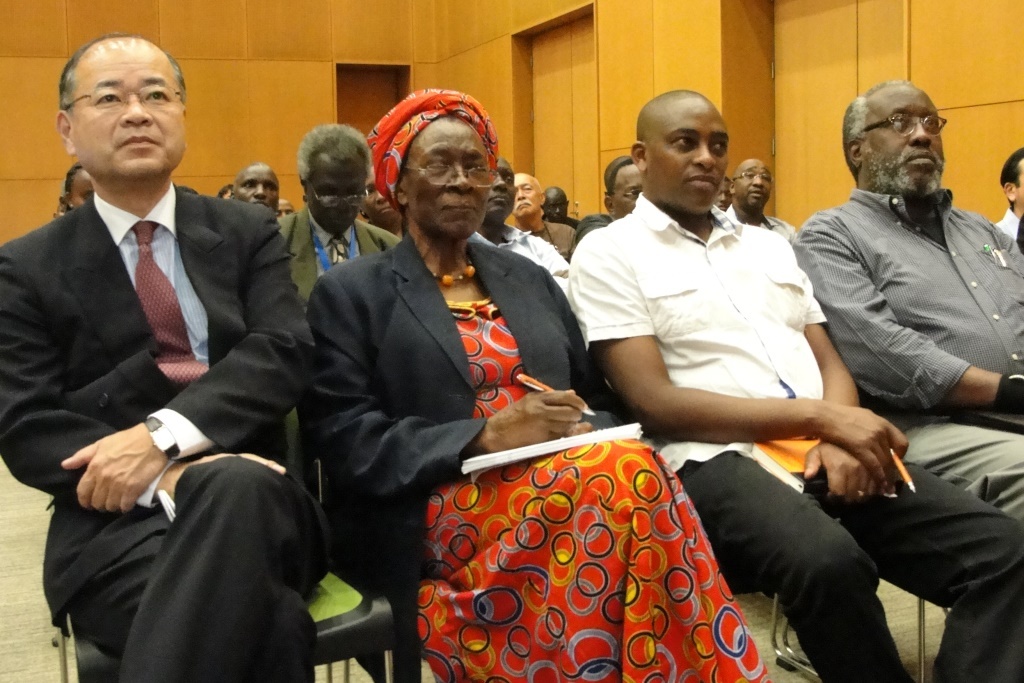 (L to R) Mr. Katayama, Prof. Were, Dr. Kaboro and Mr. Muga |
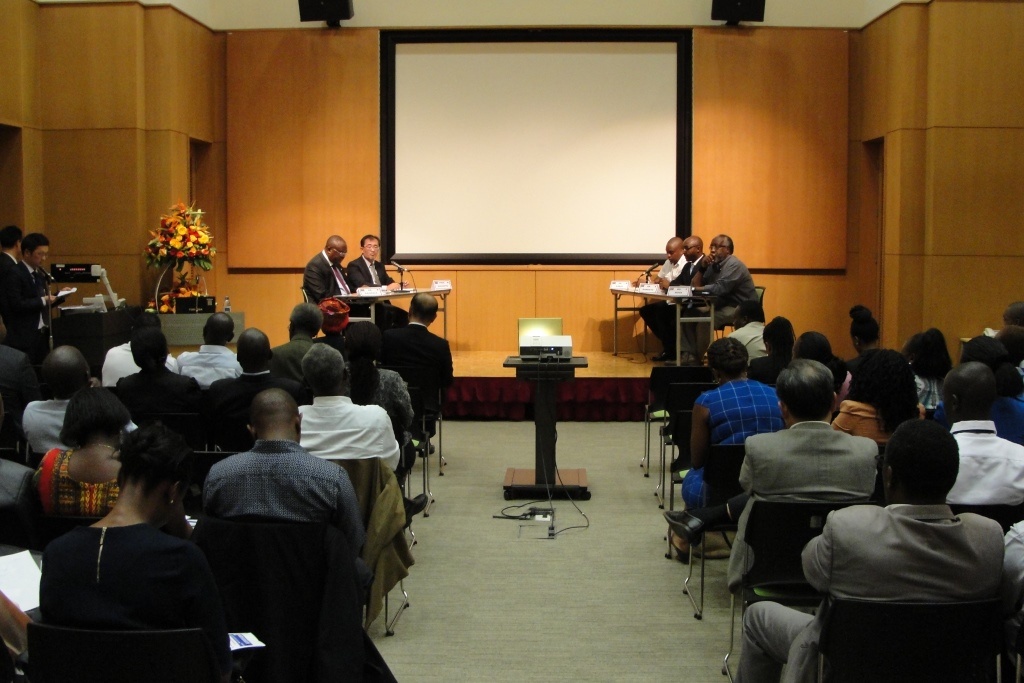
The panelists with a cross section of the audience |
The Public Lecture was officially opened by Mr. Yoshihiro Katayama, Minister Counsellor at the Embassy of Japan. In his opening remarks, Mr. Katayama stated that the Public Lecture was particularly timely given the attention accorded in recent days to the state of health services here in Kenya. He further stated that he hoped that the discussion would examine the real and very critical challenges facing healthcare provision in Africa, and also offer some ideas towards the future.
Following Mr. Katayama’s opening remarks, Prof. Sugishita, who has been engaged with the health sector in Africa for more than 20 years, delivered his presentation.
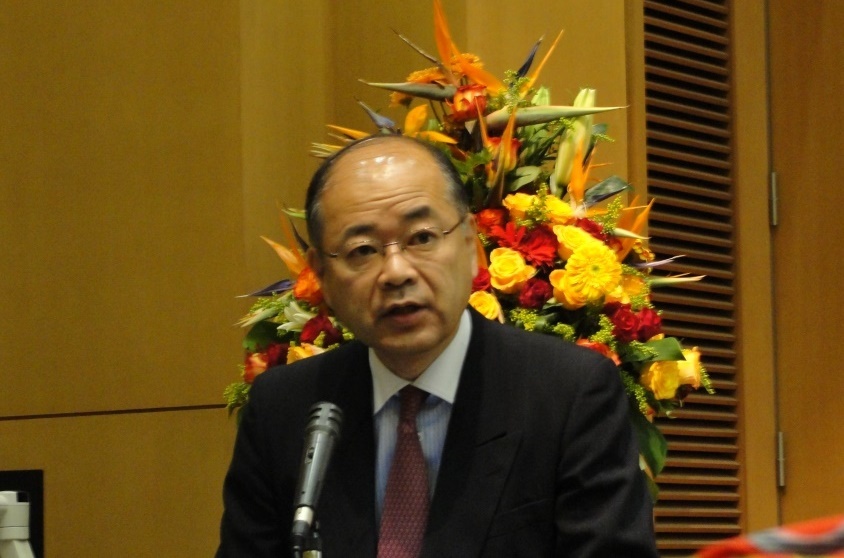
Mr. Katayama giving his opening remarks |
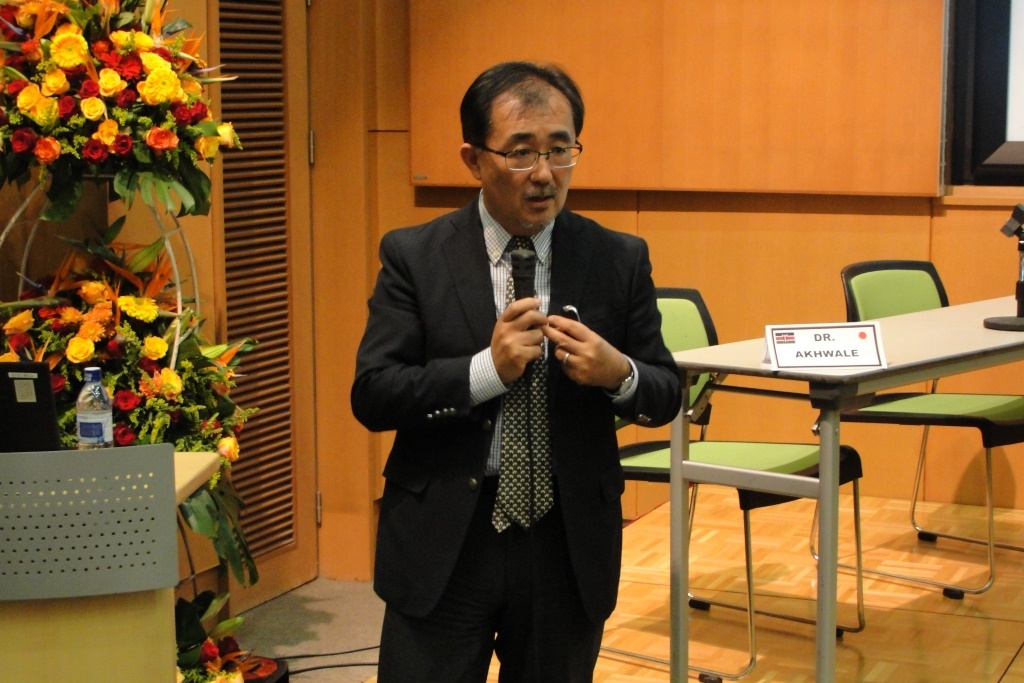 Prof. Sugishita delivering his lecture |
Giving the example of Japan’s experience in developing a robust healthcare system, Prof. Sugishita stated that after the devastation of World War 2, those left behind after the war especially women and children had to find a way of moving forward in light of their new reality. The people therefore learnt to rely on the community as opposed to being individualistic. This changed the people’s mindset where Primary Health Care and health promoting activities were more emphasised. For example, exercise became part and parcel of Japanese people’s lifestyle.
There was also an incremental development in health sector financing. Japan’s insurance system was greatly promoted as a result of the political will towards “investment for health”. The government came up with ways of letting the general population come to understand that health was costly and it was therefore important to invest in insurance.
There was also the introduction of fee regulation and control. This meant that irrespective of where a person received medical services or the qualifications of the health personnel, the fees paid was standardized.
In addition to strengthening its own health systems, Japan has also sought to promote health diplomacy. Japan has severally led the discussion on global health, most recently, the G7 Ise-Shima Summit Meeting in Japan and the 6th Tokyo International Conference on African Development (TICAD VI) in Kenya.
Prof. Sugishita concluded his lecture by giving the illustration of drifting babies. If hundreds of babies were drifting downstream, it would be impossible for one person to save all the babies without the risk of being drowned too. To solve this problem, a person would have to investigate system in which babies drifted and then deal with that issue.
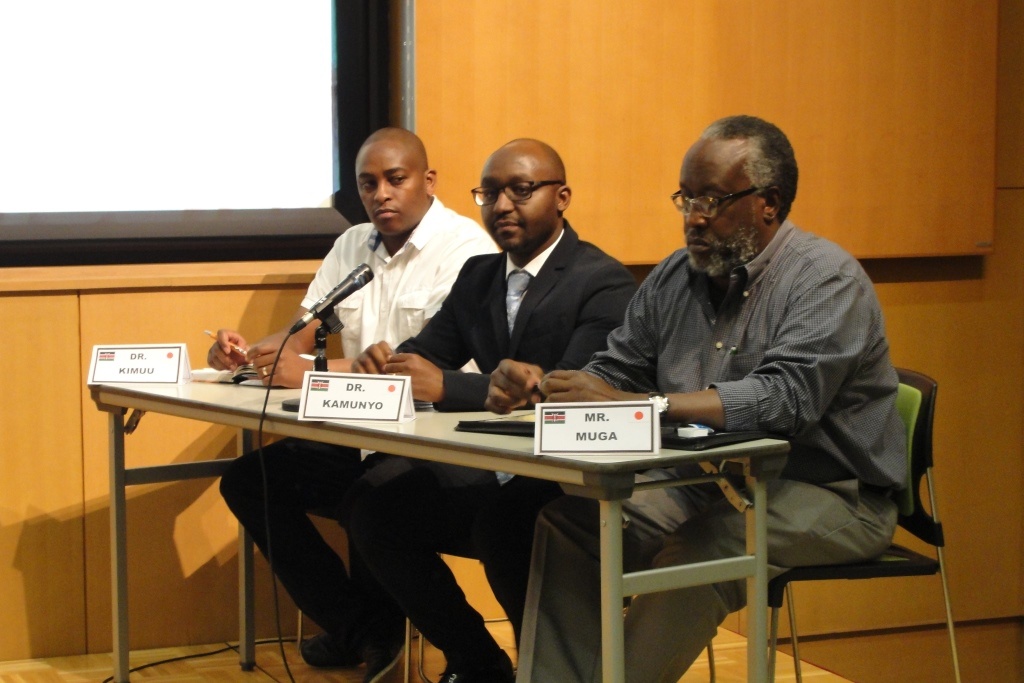
The panelists (L to R) Dr. Kaboro, Dr. Kamunyo and Mr. Muga
|
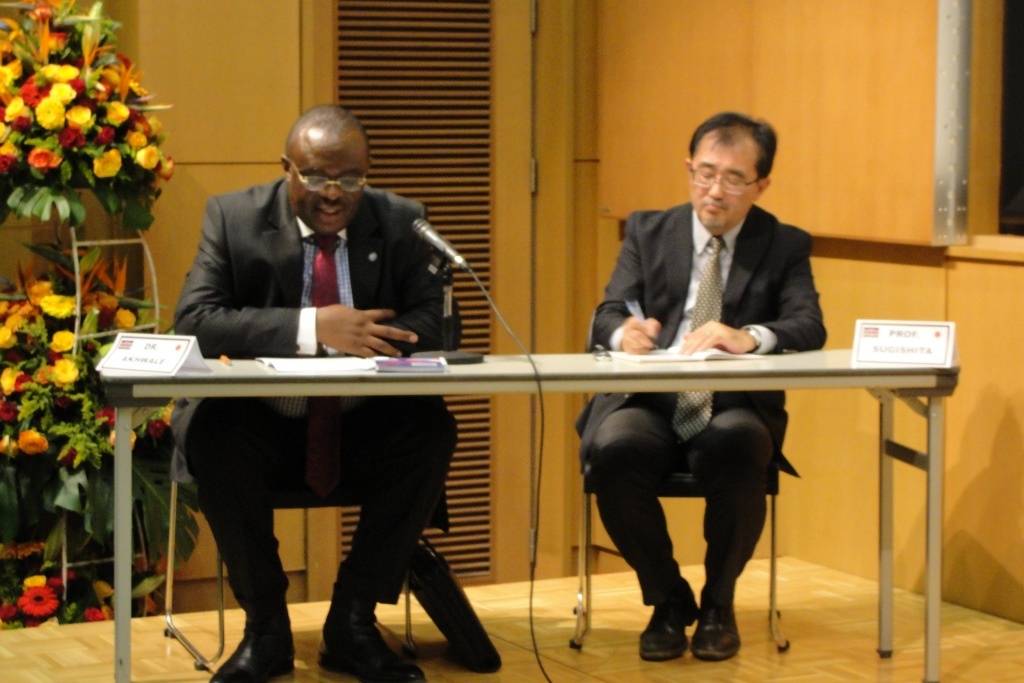
The panelists (L to R) Dr. Akhwale and Prof. Sugishita
|
Mr. Muga was the first of the panelists to comment on the discussion. He stated that considering our unique challenges, the solution is not to learn from developed countries but to come up with our own systems which reflect our reality.
Dr. Kamunyu stated that it is important for the Kenyan government to commit to funding healthcare and rope in the private sector. He also mentioned that it was important to efficiently use healthcare by reducing waste in cost and ploughing back the profits so as to further improve healthcare.
Echoing Prof. Sugishita, Dr. Kaboro reiterated that it is necessary for Kenya to develop its own healthcare policies and strategies which will move it to self-reliance. He also noted that Kenya cannot just depend on public healthcare; a public-private partnership is the only way that Kenya can truly move towards UHC.
Dr. Akhwale remarked that in Kenya, quality healthcare often corresponds to high cost. He stated that it was important to come up with a way of minimising cost and maintaining quality.
Prof. Miriam Were, the Chancellor of Moi University wrapped up the session. In her closing remarks, she noted that in promoting health, mindset determines action. The action required is on a personal level whereby each person is responsible for his/her own health. She also noted that health status is not dependent on the number of hospitals available. To promote health, it is important to prevent disease.
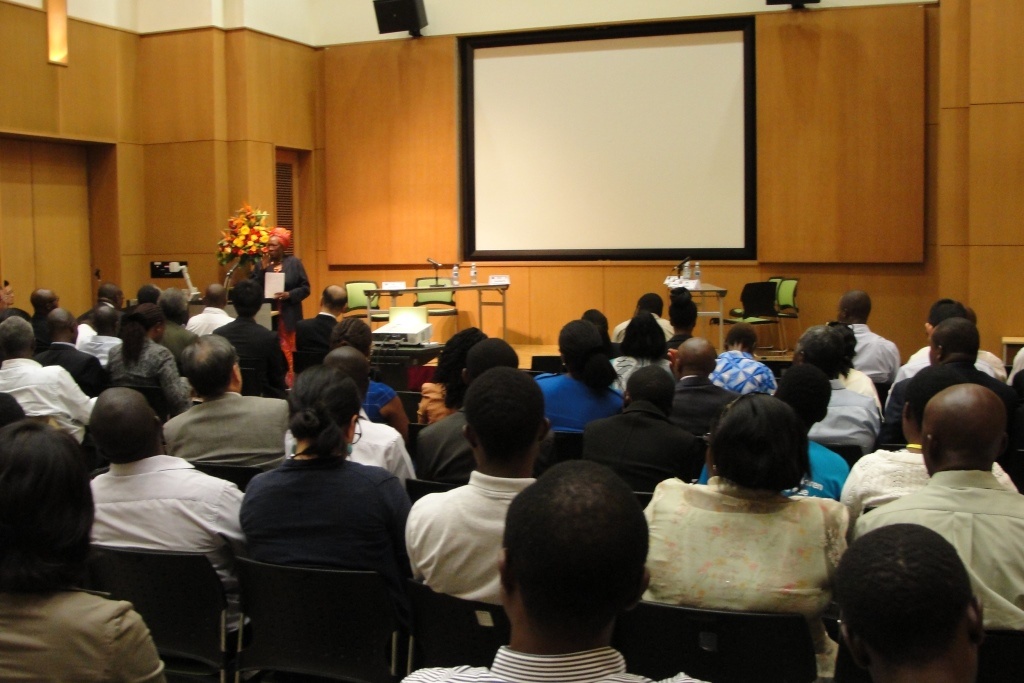 Prof. Were giving her closing remarks |
